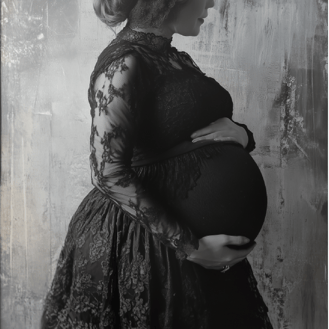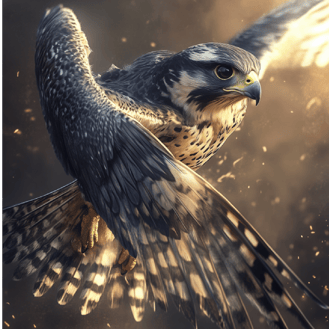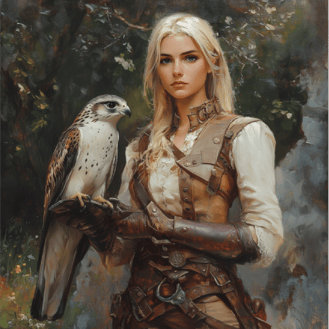Frigg - The All-Seeing Goddess of Fate, Family, and Wisdom
Step into the divine presence of Frigg, the all-seeing Goddess of wisdom, fate, and fierce maternal power. More than just Odin’s queen, she weaves the threads of destiny, guarding love, family, and deep intuition. Discover her sacred symbols, hidden influence, and how to invite her guidance into your life. Are you ready to embrace her wisdom? ✨
GODDESSES
Goddess Hive
2/22/20254 min read
Welcome, Goddess Hive! Some links in this blog are affiliate links. Meaning, if you choose to shop through the links on this page, a small percentage of the sale will go to me at no additional cost to you. Thank you for your support. Goddess bless.
The Origin and Role of Frigg
Frigg, the revered Norse Goddess of wisdom, foresight, and motherhood, stands as one of the most powerful figures in Scandinavian spiritual tradition. As the wife of Odin and the Queen of Asgard, her dominion extends beyond mere domesticity—she governs destiny, commands deep wisdom, and embodies the divine feminine’s multifaceted strength. Rooted in the belief systems of the Germanic and Norse tribes, Frigg was honored as the ultimate protector of familial bonds, childbirth, and foresight. Her presence in human consciousness has woven an unbreakable thread through tradition and even the names of the days of the week—Friday derives from "Frigg’s Day," signifying her lasting impact.
Who is Frigg? Followers, Influence, and Artifacts of Her Presence
Frigg is often depicted as a majestic, regal Goddess seated upon a high throne, clad in ethereal blue robes symbolizing the sky and wisdom. As a Goddess with unparalleled foresight, she was known to see the future but remained silent, allowing fate to unfold as it must. Her worshippers, predominantly ancient Germanic and Norse peoples, looked to her for guidance in matters of marriage, fertility, and wisdom. Frigg’s presence lingers in archaeological discoveries of pendants and carvings believed to depict her—one such artifact is the Frigg Spindle, representing her role in weaving destiny.
Sacred Symbols of Frigg
The most recognized symbols associated with Frigg include:
The Spindle and Distaff – Representing her ability to weave fate and destiny, these tools link her to fiber arts and the concept of cosmic order.
Keys – Symbolizing her authority as the keeper of Asgard’s secrets, keys are often linked to her role as a guardian of knowledge.
The Hawk or Falcon Cloak – Frigg is known to possess a magical cloak that allows her or others to take the form of a hawk or falcon, connecting her to flight, freedom, and keen foresight.
The Cloud and Sky – Some interpretations view Frigg as a sky Goddess, emphasizing her omniscience and motherly protection over all realms.
Frigg and Odin: The Power Couple of Asgard
Frigg’s consort is none other than Odin, the Allfather and ruler of the Norse deities. While Odin governs war, knowledge, and chaos, Frigg represents stability, wisdom, and love—together, they form a divine balance. Their relationship is marked by deep respect, though some stories suggest moments of separation and independence. Unlike many divine unions, Frigg is not overshadowed by her husband; she has her own halls, called Fensalir, where she reigns in her own right.
Controversies Surrounding Frigg in Modern Culture
Despite her prominence in ancient traditions, Frigg has been somewhat overshadowed in modern retellings, with figures like Freya absorbing aspects of her identity. The conflation between the two Goddesses, particularly in later poetic and literary interpretations, has led to confusion about their distinct roles. Additionally, patriarchal influences in historical retellings have diminished her role as an independent, wise sovereign; reducing her to a motherly figure rather than the cosmic force she truly embodies.
The Modern Relevance of Frigg
Why should one care about Frigg today? The answer lies in her embodiment of intuition, protection, and the power of silence. In an age where voices clamor for dominance, Frigg reminds us of the strength found in listening, the wisdom in knowing when to act, and the importance of nurturing both the self and others. Those seeking to embrace divine femininity, wisdom, or a deeper connection with fate may find profound guidance in her presence.
Connecting with Frigg in Daily Life
Honor Her on Fridays – Since Friday is named after her, setting aside this day for reflection, divination, or domestic harmony is a beautiful way to honor Frigg.
Practice Mindful Weaving or Crafting – Engage in fiber arts, knitting, or spinning as a symbolic gesture of weaving fate and embracing patience.
Meditate on Foresight – Reflect on the balance between knowing and allowing life to unfold naturally.
Light a Blue or White Candle – These colors are associated with Frigg and can be used to invite her wisdom and guidance into your space.
Create a Sacred Space – Decorate an altar with representations of keys, spindles, or falcons as offerings to Frigg.
Frigg’s wisdom is ever-present, woven into the fabric of time itself. By learning about her, we not only honor the past but also embrace the power of patience, love, and divine knowledge in our lives.
FAQs About Frigg
1. How does Frigg compare to other wisdom Goddesses?
Frigg shares similarities with other wisdom deities like Athena and Saraswati, but her wisdom is deeply tied to foresight, silence, and destiny, rather than direct intervention or warfare.
2. What is the significance of Frigg’s hall, Fensalir?
Fensalir, meaning "Marsh Halls," is Frigg’s sacred dwelling, often depicted as a peaceful and protective sanctuary. It reflects her role as a Goddess of nurturing, wisdom, and foresight.
3. Did Frigg have any children besides Balder?
Yes, in addition to Balder, Frigg is said to be the mother of Hodr, Balder’s blind brother. Some sources also name Hermod as her son, though accounts vary.
4. How can someone tell if Frigg is reaching out to them?
Signs of Frigg’s presence may include recurring symbols such as keys, spindles, or falcons, heightened intuition, or a deepening sense of calm when facing life’s uncertainties.
5. Are there historical temples or sites dedicated to Frigg?
While no grand temples have been found, archaeological evidence suggests that Norse and Germanic people honored Frigg in sacred groves and household altars, integrating her into daily spiritual practice.
6. What offerings does Frigg appreciate?
Traditional offerings to Frigg include blue or white candles, handwoven textiles, fresh herbs like chamomile or mugwort, and symbolic items such as small keys or spindles.
Sources for Further Learning
Simek, Rudolf. Dictionary of Northern Tradition. Boydell & Brewer, 1993.
Davidson, H.R. Ellis. Gods and Divine Beings of Northern Europe. Penguin Books, 1964.
Lindow, John. Norse Spiritual Traditions: A Guide to Gods, Heroes, Rituals, and Beliefs. Oxford University Press, 2001.






About us
The content provided on OMG, including blog posts, rituals, prayers, meditations, and other materials, is intended for informational, educational, and spiritual enrichment purposes only. It is not a substitute for professional medical advice, diagnosis, or treatment. If you have any concerns regarding your physical or mental health, please consult a qualified healthcare profession.
Take care of yourself first, then take care of everyone else. That is the nature of Goddess-ship.
Be well. Goddess Bless.
Empowerment
Empowering femininity through education and self-care.
Goddess
goddesshive@ohmygoddess.com
© 2024. All rights reserved.
